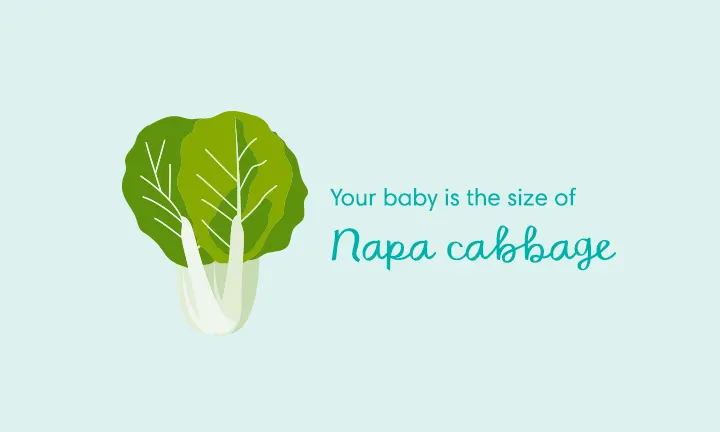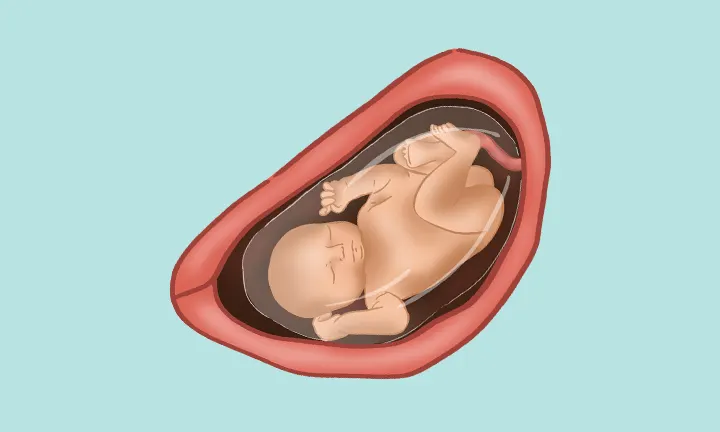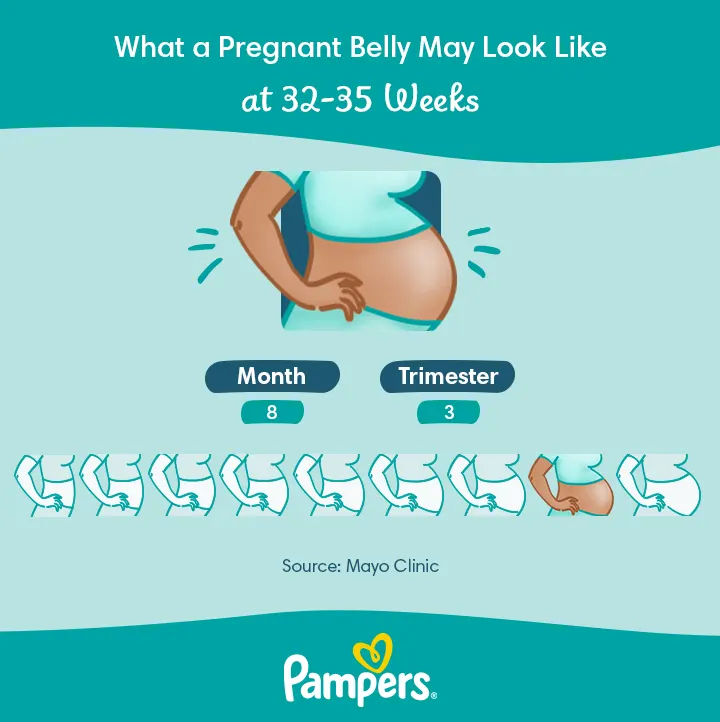32 Weeks Pregnant
Now you’re 32 weeks pregnant, you’ve probably noticed some significant changes this week and month, especially with your growing belly. We’ll dive into some common symptoms that you might be experiencing at 32 weeks pregnant, including tips on managing them and symptoms not to ignore. So, let’s explore what may be happening during this period!
Highlights at 32 Weeks Pregnant
We’ve highlighted a few of the exciting things happening at 32 weeks pregnant and some actions you might take:
Your baby may move into the head-down position at 32 weeks or in the coming weeks in preparation for delivery.
At 32 weeks, your baby may have hair on their head, eyelashes, eyebrows, and visible toenails.
Become familiar with the signs and symptoms of labour at 32 weeks and prepare your route to the hospital for when the time comes.
Do you have all your newborn essentials? We have some recommendations below.
Have you found the perfect name for your baby? If not, find some inspiration by using our fun Baby Name Generator:
RELATED PREGNANCY TOOL
Baby Name Generator
Filter by gender:
Filter by theme:
32 Weeks Pregnant: Your Baby’s Development
As your due date draws near, your little one is continuing to grow and develop into the tiny human you’ll soon meet. Check out these exciting developments:
At 32 weeks pregnant, your baby is getting closer and closer to looking like the baby you’ll meet when they’re born. For example, their eyelashes, eyebrows, and even the hair on their head are now all in place.
They’ve recently started shedding the lanugo—those fine hairs that covered your baby’s body—and most of it will be gone by now, though some babies are born with a little lanugo.
If you’re having a little boy, his testicles have started to descend into his scrotum.
Your baby may be standing on their head now, or sometime soon; most babies move into the head-down position at least a few weeks before birth. Don't be surprised if your little acrobat decides to change positions several times before they’re born. You might feel them jostling into place as they flip. You may also be feeling some pressure or movement in your pelvic area at 32 weeks or closer to your due date as your baby “drops” down into a deeper position in your pelvis.
More and more fat is forming under your baby’s skin. This has slowly turned your baby’s skin from see-through to its current, opaque state.
That’s not all: Your baby’s toenails have been growing and are now visible. Get those baby nail clippers ready—you’ll be cutting those teeny-tiny nails soon enough!
If you’re 32 weeks pregnant with twins, check out our twin pregnancy article.
How Many Months Is 32 Weeks Pregnant?
How far along is 32 weeks pregnant? Well, at 32 weeks pregnant, you’re generally considered to be in your eighth month. It all depends on how you group the 40 weeks of pregnancy into 9 months, as they don’t fit neatly.
Baby's Size at 32 Weeks Pregnant
It’s common to wonder about your baby’s size and weight at 32 weeks. Now that you’re 32 weeks pregnant, your baby weighs around 1.8 kilograms (4 pounds) and measures about 28 centimetres (11 inches) in length, crown to rump—they’re about the size of a napa cabbage! How cute!
Your Baby: What Does 32 Weeks Pregnant Look Like?
The visual below illustrates what your little one might look like and how they may be positioned at 32 weeks.
Your Body at 32 Weeks Pregnant
During pregnancy, you may experience changes in your mouth, teeth, and gums that might cause some discomfort. These could include:
Sensitive gums. If your gums feel more sensitive, or if they swell or bleed when you brush or floss, it might help to rinse with salt water and use a softer brush.
Teeth feeling looser. Hormonal changes can cause your ligaments to relax, and these same hormones may also affect the tiny ligaments that hold your teeth in place. As these ligaments relax, your teeth may feel looser. Rest assured: It’s unlikely you’ll actually lose a tooth for this reason, and this feeling usually goes away after you’ve given birth.
Mouth sores. You may get these sores because your immune system is working overtime to remove germs from your mouth. The good news is that the sores typically go away after pregnancy.
It’s important to floss daily, brush twice a day, and keep up with your regular dental checkups every six months. Experts recommend arranging any elective dental procedures to happen in the first half of the third trimester (around now) if they weren’t taken care of in the second trimester. Your dentist may recommend postponing any major dental work until after you’ve given birth.
32 Weeks Pregnant: Your Symptoms
At 32 weeks pregnant, here are some of the symptoms you may be experiencing:
Leg cramps. Have you been experiencing sharp, painful cramping in your calves around 32 weeks pregnant? You’re not alone! Unfortunately, this is a common symptom of late pregnancy. It’s not known why these leg cramps occur. Try to stretch your legs before going to sleep at night. If you experience a cramp, flex your foot upward and back and massage your calves in downward strokes. This should help.
Diarrhea. It's never pleasant, but you could come down with a bout of diarrhea around 32 weeks pregnant or at any time in pregnancy. If this happens, make sure to drink plenty of water to stay hydrated. Sometimes, diarrhea during pregnancy can also be a sign of preterm labour, so if you notice any symptoms like abdominal cramping, pelvic pressure, low backache or pain, regular contractions, or your water breaking around 32 weeks pregnant—with or without diarrhea—contact your healthcare provider immediately.
“Pregnancy brain.” You might have heard of this and be wondering whether symptoms like forgetfulness and difficulty concentrating are actually caused by your pregnancy. Though pregnancy brain isn't a true medical condition according to experts, many experience these symptoms. Try keeping to-do lists if you’re struggling to remember things.
How Big Is a Pregnant Belly at 32 Weeks?
Although every bump is different, it’s likely that your uterus has grown to about midway between your breasts and belly button this month. Your fundal height (the distance between your pubic bone and the top of your uterus) may be between about 30 to 34 centimetres (12 to 13 ½ inches) at 32 weeks.
What Does 32 Weeks Pregnant Look Like?
For a better idea of your belly bump size at 32 weeks pregnant, check out the visual below:
32 Weeks Pregnant: Things to Consider
Here are some things for you to consider at 32 weeks pregnant:
Keep an eye out for symptoms like sudden weight gain, persistent headaches, changes in vision, pains in the upper abdomen or shoulder, nausea or sudden vomiting, and swelling or puffiness at 32 weeks pregnant or any time in your pregnancy. These could be signs of a pregnancy-related high blood pressure disorder called preeclampsia. If you notice any of these symptoms, tell your healthcare provider right away.
Get to know the signs and symptoms of preterm labour to stay prepared at 32 weeks pregnant and learn the difference between real contractions and Braxton Hicks contractions. If you suspect you may be in preterm labour, contact your healthcare provider immediately. Your provider may be able to suggest ways that could help you reduce the chances of your baby being born at 32 weeks, like bed rest, drinking lots of fluids, or medications that can help stop the contractions. In some cases, a hospital stay may be recommended.
Around 32 weeks pregnant your healthcare provider may ask you to monitor fetal movements to see if there’s a sudden increase or if they’ve slowed down—your provider will be able to suggest how to proceed. One option could be to do “kick counts,” keeping track of how long it takes to count 10 movements. Pick a time of day when your baby is typically energetic—for example after you’ve eaten a meal.
Though you still have a way to go until your pregnancy is full term, you may have a lot on your plate in these final few weeks. To make life a little easier, check out our guide on choosing the best diaper for your baby. And use our helpful diaper size and weight chart guide.
Tip for Partners Are you familiar with the signs and symptoms of labour? It's a good idea to learn what these are and to have a plan for when labour begins—your partner's healthcare provider might discuss this with you, too. Being prepared and as informed as possible about labour, what to do next, and the delivery process may be helpful for both you and your pregnant partner. |
32 Weeks Pregnant: Questions for Your Healthcare Provider
Here are some questions you may want to ask your healthcare provider at 32 weeks pregnant or any time in your third trimester:
What kind of vaginal discharge should I expect at 32 weeks pregnant, and should I contact my healthcare provider if I experience vaginal pain?
Can I fly or travel abroad at 32 weeks pregnant?
Is it OK to bend over at 32 weeks pregnant?
Will I need to see my healthcare provider more often during the third trimester? And will I receive an ultrasound or growth scan at 32 weeks pregnant?
At 32 weeks pregnant, what are some symptoms not to ignore and are there any special precautions I should take during the third trimester of pregnancy?
Are any of my past pregnancy complications likely to reappear this time around?
What labour pain relief options are available, and which is recommended for me?
Should I contact my healthcare provider if I have lower back pain but no contractions at 32 weeks pregnant?
FAQS AT A GLANCE
Yes, at 32 weeks pregnant, it’s likely that you’re in your eighth month of pregnancy, depending on how you group the weeks into months.
32 Weeks Pregnant: Your Checklist
The following checklist may come in helpful during these final weeks of pregnancy:
If a friend or loved one is hosting a baby shower for you soon and you’re planning to have a gift registry, now is a good time to take care of this. Use this baby registry checklist to make sure you’ve got the essentials covered.
Stock up on any newborn baby essentials you’re still missing. If you haven’t already, you could consider planning the layout of the nursery and thinking about how you'd like to decorate it.
If you’re planning on travelling by car, do a practice drive to the hospital or birthing center around 32 weeks pregnant so that you can time how long it takes to get there. You might want to plan some alternative routes, should there be a traffic jam or road construction on the day you go into labour.
Ask if you can do a tour of the hospital or birthing center. This is a good chance to familiarize yourself with hospital policies and learn about the options that are available to you.
Familiarize yourself with how contractions may feel so you’ll know if you’re experiencing the real thing and how to time contractions when the time comes.
How We Wrote This Article The information in this article is based on the expert advice found in trusted medical and government sources, such as the American Academy of Pediatrics and the American College of Obstetricians and Gynecologists. You can find a full list of sources used for this article below. The content on this page should not replace professional medical advice. Always consult medical professionals for full diagnosis and treatment.
32 weeks pregnant - checklist


